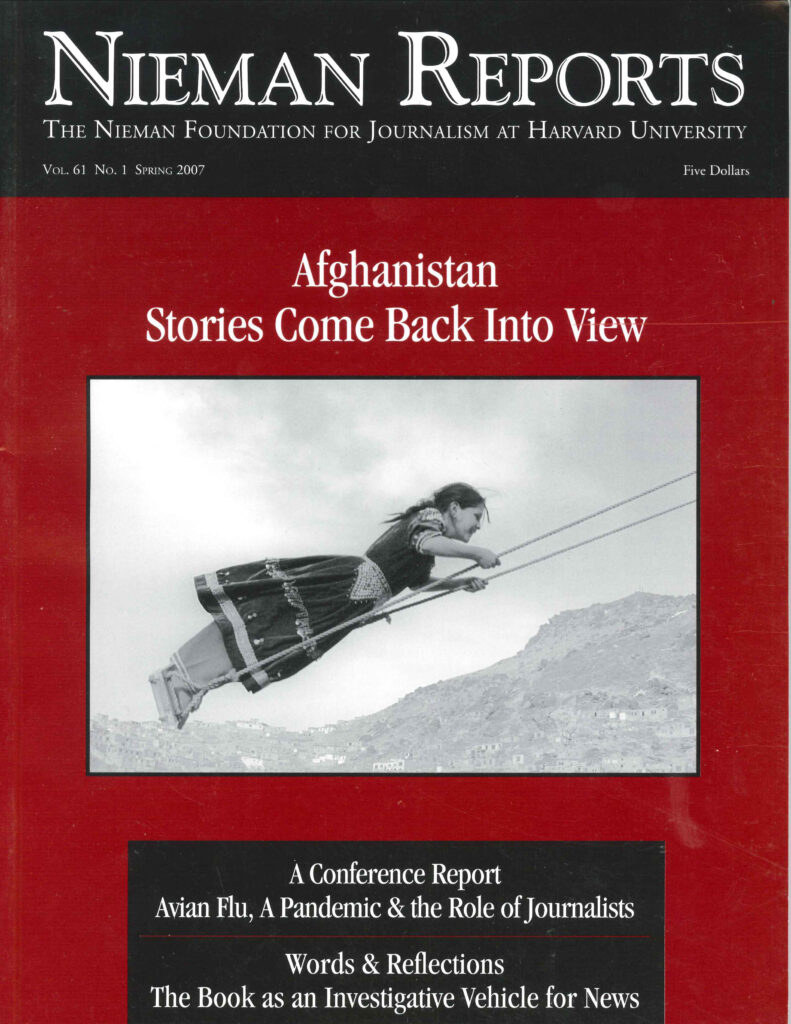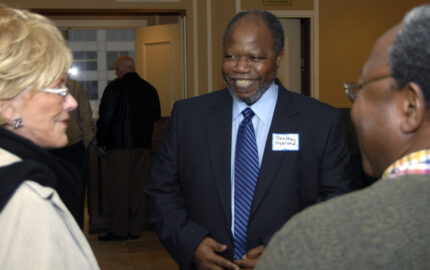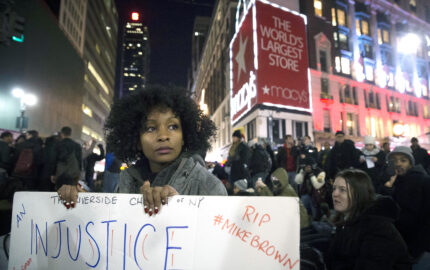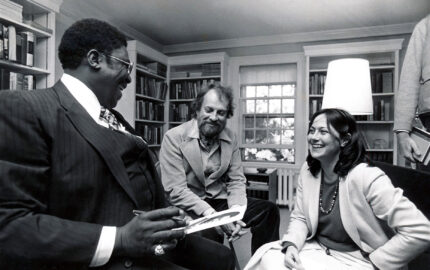
Afghanistan: Stories Come Back Into View
I feel sad that Afghanistan is back in the news. ... Afghanistan was never going to become Sweden, but had the world really been committed to rebuilding it after 2001, and not been distracted by Iraq, then the return of Western journalists to report again on another war might never have been necessary.
Allister Sparks, of South Africa, is my closest and dearest friend, although we are thousands of miles apart. We have been friends since we were Niemans together in 1962-63. And each in our own countries, we have done journalism the old fashioned way — he reporting on the evils of apartheid, I covering the struggles for civil rights in the south. And we have visited each other's country — he when he needed respite to write a book, I when I had a chance to teach journalism to newly freed young journalists in the new South Africa.
But recently, I heard from a friend that Allister, a winner of the Louis Lyons award, among others, no longer wished to visit the United States because of its behavior since September 11, 2001. I asked him why and suggested I convey his thoughts to others, just as I wrote once for an American audience a long time ago about apartheid in South Africa. Allister still writes a syndicated column and works as a consultant for a South African bank. Here's what he replied [This essay first appeared on the Nieman Watchdog Web site.]:
What I said was that I had no wish to visit the U.S.... I shall probably have to in the course of my work for the bank — although I may well be denied entry because of all the stamps of Arab countries in my passport — especially Syria. A friend of mine, the head of political analysis at our important Human Sciences Research Council, was turned back from Kennedy Airport the other day for that reason. Or it may have been because he has a slightly dark skin and a Muslim name, Adam Habib.
But I must confess that I have felt paralyzed, too, by your challenge to me to write for a U.S. audience about your country, or at least to write to you so that you can communicate those thoughts in the stuff you are writing for the Nieman alumni. This is hard to explain. I guess it's a bit like the break-up of a love affair. For so long the United States has been a kind of lodestar for me in my more idealistic beliefs, beginning with my Nieman experience and the idealism of the Kennedy years, the civil rights campaign, and all that followed.
Whenever I felt down, struggling to maintain a sense of optimism in all the gloom of life in the midst of a twisted ideology and personal defeats, I would travel to the United States to have my batteries recharged.
But now that pattern of my life has been reversed. My own country has emerged, albeit still with many faults, as a beacon of racial reconciliation and coexistence that gives me at least some sense of personal fulfillment in my evening years, while my old moral lodestar, the U.S., has slipped into an abyss of moral degeneracy, of political lies and casuistry, of torture and cruelty and of a contempt for human rights and human decency that violates your own supposedly sacred Constitution. For me emotionally, it is as though the U.S. has become the old South Africa — and although you challenge me to write about this in the U.S., as you yourself once did in South Africa, I find that, frankly, after all I have been through, I do not now, at the age of nearly 74, want to revisit the old South Africa. To fight that fight once in a lifetime is surely enough.
I must stress that it is not only the behavior of the Bush administration that repels me, but the craven obsequiousness of the U.S. media, both television and newspapers. As you know I was in the U.S. at the time of 9/11 and so I am aware of and sensitive to the shock of that terrible event, but I have been appalled from the very beginning at the meek and uncritical way television and even the great newspapers have reported and commented on the decision to go to war in Iraq — the triumphalist coverage of the "shock and awe" bombardment of Baghdad with no thought for the thousands of Iraqis being incinerated in it.
On my several visits to the U.S. in the course of this war I have been disgusted by all the cheerleading for your "brave boys in Iraq," the flag-waving and the craven desire to be seen as patriotic that wiped out the journalistic duty to ask the tough questions about why the war was being fought, who told the lies, or even to portray the carnage that was taking place inside Iraq. I was appalled to see newspapers and journalists I had admired, old friends and colleagues, fall into the conformist trap of jingoistic patriotism. Even the op-ed page of my own old newspaper, The Washington Post, was fully in step with Bush, Rumsfeld and the other neocons.
I felt betrayed. I had faced all those pressures for patriotic coverage when my own country went to war against those it called "terrorists" in what is now Namibia and in South Africa itself, and when I defied those huge pressures I was applauded and given awards (including the Nieman Foundation's Louis M. Lyons award) by the American journalistic establishment.
I came to despise the very concept of patriotism, which so often through the ages has been used to command support for evil. Now I had to watch while that journalistic establishment that had applauded me itself succumbed to the patriotic pressures. To such an extent that it was left to a few magazines, notably The New Yorker, to expose the crimes against humanity that were being committed.
Only now, as the tide of fortune is turning and it is clear that America is losing the war, is the press reportage and commentary turning against the war — in an opportunistic way that I find almost equally contemptible. If it looks like you're winning, the war is wonderful; when you start losing, it was all a wretched mistake.
And even now, the essence of the new opposition to the war is that too many American troops are being killed. More than 3,000. Never mind the 150,000 Iraqis that have been slaughtered, or the fact that their country has been destroyed, perhaps for generations to come. The cry is to get out. Bring the brave boys home. Forget the shattered lives and the shattered country left behind. Turn now to carrying the "war on terrorism" to Somalia — and maybe Iran, and who knows where else.
Nor is the Iraq War the only thing that has disillusioned me about the country I once so admired. I was in the Middle East at the time of the Palestinian elections and was shocked by the refusal of the U.S. to accept the clear victory of Hamas, even though the election was declared "free and fair" by Jimmy Carter's observers among others. Wasn't the final justification for the Iraqi war that it was being waged to bring democracy to the Middle East?
After talking to Palestinians in Qatar, including both the managing director and editor in chief of Al Jazeera, who have become friends, I began to suspect that my own impressions of Hamas may have been distorted by stereotyped reporting in much the same way that my impressions of the ANC had been in South Africa — even though I had thought myself immune to apartheid regime propaganda. Even liberal South Africans shunned the ANC as a "terrorist organization."
When I ceased to be editor of the Rand Daily Mail and other papers and became a foreign correspondent for The Washington Post el al., I decided to visit the ANC in exile and check out those preconceived impressions. As I think you know, it was an eye-opening experience for me to discover how sophisticated and pragmatic they were. It was an experience that changed my entire outlook on what should happen in my own country.
Recalling that, I decided to do the same with Hamas. So last September, on my own account and for my own personal interest, I flew to Damascus and spent two days at Hamas headquarters talking to their exiled leaders. Again it was an eye-opening experience to hear their side of the story and discover the degree to which they, too, are sophisticated, pragmatic people who I believe are the only ones capable of negotiating a peace agreement that could stick — since, like the ANC, they are the only ones whose control extends to the people with the guns.
I came away with five hours of tape recorded conversation with these key leaders whom the authorities of both Israel and the U.S. refuse to speak to — because they are "terrorists." I don't know of any other Western journalist who has done this. Why? Why haven't these men and women who have preached to me over so many years about the importance of balanced reporting and getting "the other side of the story" done what I, with no funding or backing of any big organization, did?
If I do get into the U.S., the only pleasure I shall derive from it will be in visiting you and a number of other very dear friends. Just as you did in the old days, I draw a sharp distinction between a country and the many fine individuals in it. I admire your idealism and your resilience and the determination with which you keep the voice of sanity alive in a country — and within a profession — that has lost its way. But the task is too big for me.
I don't want to look back into that abyss from which I have only just emerged.
Saul Friedman, a 1963 Nieman Fellow, is a former White House correspondent for Newsday and Knight Ridder newspapers and now writes a weekly column, "Gray Matters," dealing with senior issues, for Newsday.
But recently, I heard from a friend that Allister, a winner of the Louis Lyons award, among others, no longer wished to visit the United States because of its behavior since September 11, 2001. I asked him why and suggested I convey his thoughts to others, just as I wrote once for an American audience a long time ago about apartheid in South Africa. Allister still writes a syndicated column and works as a consultant for a South African bank. Here's what he replied [This essay first appeared on the Nieman Watchdog Web site.]:
What I said was that I had no wish to visit the U.S.... I shall probably have to in the course of my work for the bank — although I may well be denied entry because of all the stamps of Arab countries in my passport — especially Syria. A friend of mine, the head of political analysis at our important Human Sciences Research Council, was turned back from Kennedy Airport the other day for that reason. Or it may have been because he has a slightly dark skin and a Muslim name, Adam Habib.
But I must confess that I have felt paralyzed, too, by your challenge to me to write for a U.S. audience about your country, or at least to write to you so that you can communicate those thoughts in the stuff you are writing for the Nieman alumni. This is hard to explain. I guess it's a bit like the break-up of a love affair. For so long the United States has been a kind of lodestar for me in my more idealistic beliefs, beginning with my Nieman experience and the idealism of the Kennedy years, the civil rights campaign, and all that followed.
Whenever I felt down, struggling to maintain a sense of optimism in all the gloom of life in the midst of a twisted ideology and personal defeats, I would travel to the United States to have my batteries recharged.
But now that pattern of my life has been reversed. My own country has emerged, albeit still with many faults, as a beacon of racial reconciliation and coexistence that gives me at least some sense of personal fulfillment in my evening years, while my old moral lodestar, the U.S., has slipped into an abyss of moral degeneracy, of political lies and casuistry, of torture and cruelty and of a contempt for human rights and human decency that violates your own supposedly sacred Constitution. For me emotionally, it is as though the U.S. has become the old South Africa — and although you challenge me to write about this in the U.S., as you yourself once did in South Africa, I find that, frankly, after all I have been through, I do not now, at the age of nearly 74, want to revisit the old South Africa. To fight that fight once in a lifetime is surely enough.
I must stress that it is not only the behavior of the Bush administration that repels me, but the craven obsequiousness of the U.S. media, both television and newspapers. As you know I was in the U.S. at the time of 9/11 and so I am aware of and sensitive to the shock of that terrible event, but I have been appalled from the very beginning at the meek and uncritical way television and even the great newspapers have reported and commented on the decision to go to war in Iraq — the triumphalist coverage of the "shock and awe" bombardment of Baghdad with no thought for the thousands of Iraqis being incinerated in it.
On my several visits to the U.S. in the course of this war I have been disgusted by all the cheerleading for your "brave boys in Iraq," the flag-waving and the craven desire to be seen as patriotic that wiped out the journalistic duty to ask the tough questions about why the war was being fought, who told the lies, or even to portray the carnage that was taking place inside Iraq. I was appalled to see newspapers and journalists I had admired, old friends and colleagues, fall into the conformist trap of jingoistic patriotism. Even the op-ed page of my own old newspaper, The Washington Post, was fully in step with Bush, Rumsfeld and the other neocons.
I felt betrayed. I had faced all those pressures for patriotic coverage when my own country went to war against those it called "terrorists" in what is now Namibia and in South Africa itself, and when I defied those huge pressures I was applauded and given awards (including the Nieman Foundation's Louis M. Lyons award) by the American journalistic establishment.
I came to despise the very concept of patriotism, which so often through the ages has been used to command support for evil. Now I had to watch while that journalistic establishment that had applauded me itself succumbed to the patriotic pressures. To such an extent that it was left to a few magazines, notably The New Yorker, to expose the crimes against humanity that were being committed.
Only now, as the tide of fortune is turning and it is clear that America is losing the war, is the press reportage and commentary turning against the war — in an opportunistic way that I find almost equally contemptible. If it looks like you're winning, the war is wonderful; when you start losing, it was all a wretched mistake.
And even now, the essence of the new opposition to the war is that too many American troops are being killed. More than 3,000. Never mind the 150,000 Iraqis that have been slaughtered, or the fact that their country has been destroyed, perhaps for generations to come. The cry is to get out. Bring the brave boys home. Forget the shattered lives and the shattered country left behind. Turn now to carrying the "war on terrorism" to Somalia — and maybe Iran, and who knows where else.
Nor is the Iraq War the only thing that has disillusioned me about the country I once so admired. I was in the Middle East at the time of the Palestinian elections and was shocked by the refusal of the U.S. to accept the clear victory of Hamas, even though the election was declared "free and fair" by Jimmy Carter's observers among others. Wasn't the final justification for the Iraqi war that it was being waged to bring democracy to the Middle East?
After talking to Palestinians in Qatar, including both the managing director and editor in chief of Al Jazeera, who have become friends, I began to suspect that my own impressions of Hamas may have been distorted by stereotyped reporting in much the same way that my impressions of the ANC had been in South Africa — even though I had thought myself immune to apartheid regime propaganda. Even liberal South Africans shunned the ANC as a "terrorist organization."
When I ceased to be editor of the Rand Daily Mail and other papers and became a foreign correspondent for The Washington Post el al., I decided to visit the ANC in exile and check out those preconceived impressions. As I think you know, it was an eye-opening experience for me to discover how sophisticated and pragmatic they were. It was an experience that changed my entire outlook on what should happen in my own country.
Recalling that, I decided to do the same with Hamas. So last September, on my own account and for my own personal interest, I flew to Damascus and spent two days at Hamas headquarters talking to their exiled leaders. Again it was an eye-opening experience to hear their side of the story and discover the degree to which they, too, are sophisticated, pragmatic people who I believe are the only ones capable of negotiating a peace agreement that could stick — since, like the ANC, they are the only ones whose control extends to the people with the guns.
I came away with five hours of tape recorded conversation with these key leaders whom the authorities of both Israel and the U.S. refuse to speak to — because they are "terrorists." I don't know of any other Western journalist who has done this. Why? Why haven't these men and women who have preached to me over so many years about the importance of balanced reporting and getting "the other side of the story" done what I, with no funding or backing of any big organization, did?
If I do get into the U.S., the only pleasure I shall derive from it will be in visiting you and a number of other very dear friends. Just as you did in the old days, I draw a sharp distinction between a country and the many fine individuals in it. I admire your idealism and your resilience and the determination with which you keep the voice of sanity alive in a country — and within a profession — that has lost its way. But the task is too big for me.
I don't want to look back into that abyss from which I have only just emerged.
Saul Friedman, a 1963 Nieman Fellow, is a former White House correspondent for Newsday and Knight Ridder newspapers and now writes a weekly column, "Gray Matters," dealing with senior issues, for Newsday.


